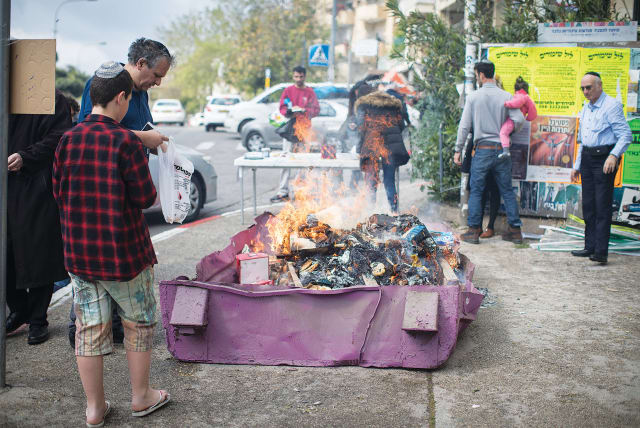Let them eat cake: What's at stake with Israel's controversial Hametz law?

SOCIAL AFFAIRS: Why are hospitals being targeted with a new law banning Hametz over Passover? How will it affect staff, and is there a halachic basis for it?
Guards at the entrances to hospitals around the country generally have their hands full. They check visitors and what they’re bringing with them for suspicious objects and prevent any possible terrorist activity or criminal intent from crossing the barrier into the institutions that are focused on healing the sick.
This Passover, following the Knesset’s passage of the contentious Hametz Law, they’ll now have one more task added to their list – checking whether visitors are bringing in not-for-Passover food items in their bags.
The law pushes hospital directors to completely block glutenous leavened food, hametz, from entering hospitals. This follows Jewish law, which prohibits consuming hametz during Passover. It also prohibits owning it, but that applies only to personal dwellings, not public spaces.
So, if public spaces are not part of the equation, why are hospitals being targeted?
Hospitals are one of the very few, if not the only, places that a person has no choice but to go to. If you are in need of medical attention, it cannot be avoided. And, of course, food is served there.
The bill would allow enforcement by a hospital director to ensure that no one, Jewish or not, patient or staff, would be able to bring hametz into the hospital.
THE FOOD in Israeli hospitals is kosher. If the patient majority is Arab, Christian, or secular and light traditionalist Jews, the food available when visiting a hospital would require them to follow a diet that may not apply to them.
Nearly half of all Israeli Jews support allowing hametz – leavened food traditionally prohibited on Passover – into hospitals during the holiday, despite most Israelis not eating any during that time, according to a pre-Passover poll from the Israel Democracy Institute.
The survey found that eschewing hametz during the holiday is rather widespread in Israel, even among the nonobservant, and discussed both hospitals and IDF bases.
This new law affects anyone entering a hospital, from cleaning staff to pharmacists, from cafeteria workers to surgeons, and even the security staff that keeps the place secure for all.
Shirelle Weingarten is a registered nurse at Sheba Medical Center, Tel Hashomer, in Ramat Gan. Speaking with The Jerusalem Post, she did not see much of a need for actions like this to be taken. When the nurses in her unit are at work, they are doing just that – they are at work.
Weingarten is a religious Jew who made aliyah from the United States prior to pursuing her nursing degree at Tel Aviv University. She explained that the intensity of the job did not always allow for full meal breaks and that even when they did, her colleagues were not concerned with hospital restrictions; they just wanted to eat and would eat what was around them.
Practical considerations
“In my unit at Tel Hashomer, there are 24 nurses. Of those, only 10 are Jewish,” Weingarten explained. “The rest of the nurses are Arab, so I am curious how Ramadan will be affected by this.”
She further stated that she didn’t foresee the law impacting the dietary restrictions of patients, but that it would more so impact staff.
“If they bring their food from home, I don’t think they’ll bring bread, but it definitely won’t be anything kosher for Passover. The patients, I would say, are religious or Jewish Israeli for the most part, but our eating wouldn’t really affect them, because our break room isn’t near their food at all, and we usually don’t have time to eat at the nurses' station,” Weingarten said.
Israeli Jews are far more unified in regard to an aspect of enforcing the Hametz Law, specifically regarding bag searches.
A vast majority of Israeli Jews (76%) opposed letting hospital staff search bags of visitors for hametz during the holiday. This was also the case among observant Jews, even ultra-Orthodox Jews, where a large swath of the demographic (41%) opposed the measure. On party lines, most (57%) coalition supporters and almost all (91.5%) opposition supporters agreed.
Interestingly, this is very different compared to opinions on bringing hametz into IDF bases. Here, just 54% of Israeli Jews think hametz should be banned, but even fewer Israeli Jews (39.5%) think it should be allowed.
One possible solution that a majority (59%) of Israeli Jews endorsed was the establishment of “hametz zones” in hospitals. This would let visitors who eat leavened bread products during Passover do so safely in the hospital without bothering anyone. This was also supported by a wider majority (70%) of Israeli Arabs.
“I think because I’m in Tel Hashomer and we’re in the Center, it’s a different demographic of workers. A hospital in Jerusalem or another region in Israel would be different,” Weingarten added.
Shortly after the bill was passed into law, Weingarten reflected that the subject had not come up among her colleagues, until it did.
“My Arab coworker and I spoke about it a drop, and she said she wasn’t sure if it was officially passed, but that she heard that in the hospital in Safed, they are checking bags. And we were both like, what? How can they control or monitor that?”
According to the bill’s explanatory section, the legislation was intended to overcome a ruling by the High Court of Justice in April 2020 that a ban on bringing hametz into a hospital on Passover was given without authority and therefore void.
According to the ruling, such a ban prevents patients who were forced into hospitalization and do not follow Jewish law from eating in their own personal space, and thus “violates their personal autonomy as an individual, which is a derivative of a person’s human dignity and the recognition of a person’s value and freedom, and, since these are restrictions for religious reasons – [violates] the freedom from religion.”
Is there a halachic justification for the law?
Labor MK Gilad Kariv expressed pitfalls in the law, its enforcement, and the underlying societal issues associated with it passing into legislation.
Kariv told the Post that this action was the work of ultra-Orthodox factions trying to manipulate civil law with a religious agenda.
“Any attempt to promote religious practices through legislation breaches the basic civil right in freedom of religion and conscience,” he said. “It also breaches the status of Jewish tradition among millions of Israelis who identify as secular and light traditional.
“This legislation does not allow hospitals to prevent [people], in an active way, from bringing food into the hospital. The legislation is not a practical element and is all about creating a declaration,” he said.
Kariv felt concerned about what other public spaces would ultimately be affected by laws of this nature.
“The Orthodox establishment in Israel is adopting more and more haredi standards, becoming more extreme. Now, suddenly the hospital isn’t kosher if it isn’t being checked at the entrance,” he said.
“What is the next step? If an ultra-Orthodox Jew is [taking] the train from Jerusalem to Haifa, and someone is [eating] hametz in their train car, what kind of dynamic is there now?”
Ultimately, Kariv connected has argument back to the root – Jewish law. “[This legislation] is not rooted in Jewish law. There is no obligation for a person to prevent their neighbor from eating hametz. The rule that the hametz must not be seen is only your private space, not the public domain. If someone brings hametz, you aren’t responsible for it. Why the additional restrictions?”
Jerusalem Post Store
`; document.getElementById("linkPremium").innerHTML = cont; var divWithLink = document.getElementById("premium-link"); if (divWithLink !== null && divWithLink !== 'undefined') { divWithLink.style.border = "solid 1px #cb0f3e"; divWithLink.style.textAlign = "center"; divWithLink.style.marginBottom = "15px"; divWithLink.style.marginTop = "15px"; divWithLink.style.width = "100%"; divWithLink.style.backgroundColor = "#122952"; divWithLink.style.color = "#ffffff"; divWithLink.style.lineHeight = "1.5"; } } (function (v, i) { });


